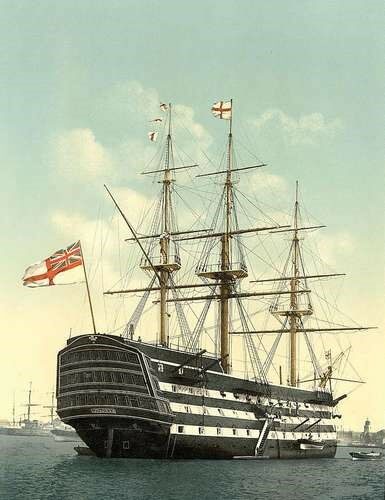I remember visiting the HMS Victory in Portsmouth as an English schoolboy. The Battle of Trafalgar and Lord Nelson’s heroic demise had everything to attract the interest of young English boys. So it is not surprising that I’ve thoroughly enjoyed the Patrick O’Brian naval war novels about the adventures of Captain Aubrey and his surgeon friend, Dr Maturin. I recently finished the eighth in the series, The Ionian Mission, about Captain Aubrey's service with the British squadron blockade of Toulon in 1813. To entertain the men on board Aubrey’s ship, the Worcester, an oratorio was organized using whatever musical talents were available among the crew. After a search, it was revealed that five young lads from Lancashire were word-perfect in Handel's Messiah, having sung it numerous times in their homeland. O'Brian provides such a wonderful image of these poor lads on board a man-of-war during the Napoleonic wars:
They were poor thin little undernourished creatures with only a few blue teeth among them, though young: they had been taken up (by the press gang) for combining with others to ask for higher wages and sentenced to transportation; but as they were somewhat less criminal than those who had made the demand they were allowed to join the Navy instead. They had gained by the change, particularly as the Worcester was a comparatively humane ship; yet at first they were hardly aware of their happiness. The diet was more copious than any they had ever known. Six pounds of meat per week (though long preserved, bony and full of gristle), seven pounds of biscuits (though infested) would have filled them out in their youth, to say nothing of the seven gallons of beer in the Channel or seven pints of wine in the Mediterranean; but they had lived so long on bread, potatoes and tea that they could scarcely appreciate it, particularly as their nearly toothless gums could hardly mumble salt horse and biscuit with any profit. What is more, they were the very lowest form of life on board, landlubbers to the ultimate degree - had never seen even a duckpond in their lives - ignorant of everything and barely acknowledged as human by the older men-of-war's men - objects to be attached to the end of a swab or a broom, occasionally allowed, under strict supervision, to lend their meagre weight in hauling in a rope. Yet after the first period of dazed and often seasick wretchedness they learnt to cut their beef right small with a purser's jackknife and pound it with a marlin-spike; they learnt some of the ways of the ship; and their spirits rose wonderfully when they came to sing.
The O'Brian novels provide an extraordinary glance into our nautical past and are rich in imagery.
*Originally posted in August 2020


Comments ()